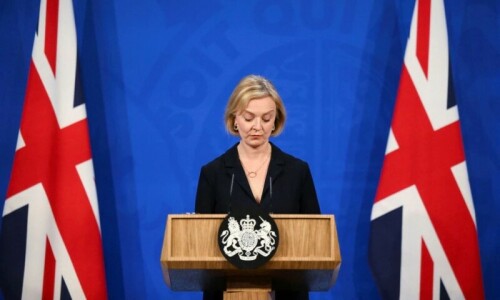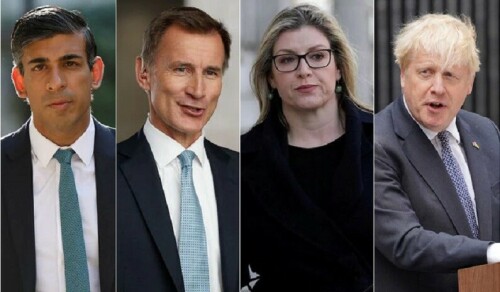LONDON: Liz Truss on Tuesday battled to salvage her position as Britain’s prime minister, after market turmoil at her tax-slashing plans forced a series of humiliating U-turns that have put her job in jeopardy.
The beleaguered leader — only six weeks into her tenure — met senior ministers for their weekly cabinet, the day after new chancellor of the exchequer Jeremy Hunt announced almost all her debt-fuelled tax cuts would be reversed.
Truss reiterated her government “had gone too far and too fast” in its mini-budget unveiled last month, her office said, as she bids to stabilise weeks of economic and political tumult sparked by the package.
Hunt, who replaced her sacked ally Kwasi Kwarteng last Friday, urged ministers “to look at finding ways to save taxpayers’ money,” ahead of detailing the government’s revised medium-term fiscal plans on Halloween.
Spokesman denies calls for embattled premier to resign; pollster says she is the most unpopular leader
“The cabinet [members] are fully supportive of the prime minister and it was an effective and in-depth discussion,” Truss’s spokesman told reporters, denying there were any calls for the embattled premier to resign.
But even Conservative MPs are publicly joining opposition lawmakers in declaring her position untenable, with the 47-year-old’s credibility seemingly in tatters.
Less than two months after electing her Tory leader, a new YouGov poll of the party’s membership found a stunning reversal in her fortunes, with a majority now saying she should go.
The pollster also found she was the most unpopular leader it has ever tracked, scoring a net favourability of -70.
“Unprecedented unpopularity,” tweeted YouGov’s Patrick English.
Spending cuts
The government’s September 23 mini-budget sent bond yields spiking and the pound collapsing to a record dollar-low on fears of rocketing UK debt.
Truss had already staged two embarrassing U-turns, scrapping tax cuts for the richest earners and on company profits, before then firing close friend Kwarteng.
On Monday, his replacement Hunt announced that not only would the remaining tax curbs be reversed, but a previously two-year cap on consumer energy bills would now be limited to six months.
He estimated all the changes would raise about 32 billion ($36 billion) per year, after economists estimated the government faced a 60-billion black hole. Hunt also warned of tough spending cuts.
His interventions sent the British pound soaring against the dollar and euro, while bond yields dipped.
Truss sought to draw a line under the largely self-inflicted crisis by apologising for the first time in a BBC interview on Monday. But she insisted she would remain in office.
It followed a day branded farcical by critics, in which she failed to turn up to an urgent question tabled by the leader of the main Labour opposition in parliament, instead sending cabinet colleague Penny Mordaunt.
After she doggedly defended the prime minister for an hour, Truss then appeared sheepishly to take her place next to Hunt as he announced the dismemberment of her economic agenda.
She is set to return to the House of Commons on Wednesday for a session of Prime Minister’s Questions seen as a crucial, possibly last, opportunity to reassert her authority.
‘Ghost PM’
Following Monday’s performance, The Sun tabloid branded Truss “the Ghost PM”, while left-wing tabloid The Mirror called the situation a “catastrophic humiliation”.
Even The Daily Telegraph, typically loyal to Conservatives, questioned her future.
“It’s hard to conceive of a more serious political and economic crisis in recent times than that which Britain now faces,” its editorial said.
The paper added she faced “the ignominy” of becoming the country’s second shortest-serving prime minister in history, unless her own MPs gave her “breathing space”.
But that appears increasingly unlikely, as reports continue of Tory lawmakers plotting to oust her.
Under current party rules, she cannot be challenged internally through a no-confidence vote in the first year, but speculation is rife they could be changed to allow for a ballot.
Conservative MP Roger Gale said on Monday Hunt had become “de facto prime minister”, as several MPs publicly urged her to resign.
Published in Dawn, October 19th, 2022













































